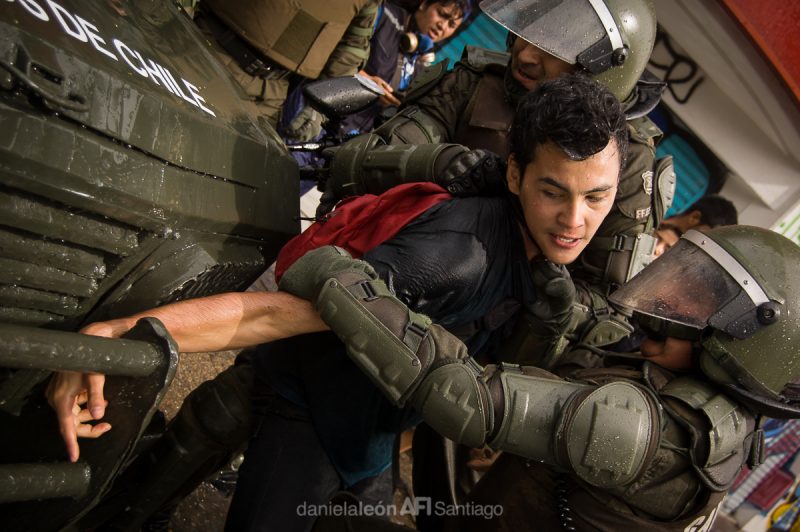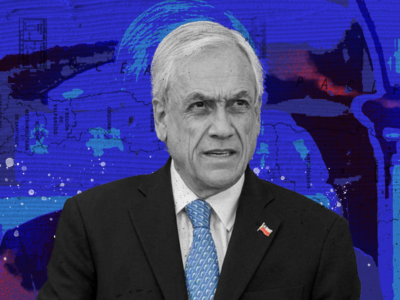
Photo from the “Mesada” album, in commemoration of the one-month anniversary of the 2019 uprising in Chile. Used with permission.
In 1981, during Augusto Pinochet's US-backed dictatorship in Chile, a group of photographers that included co-founder Paz Errázuriz created the Association of Independent Photographers (AFI for its initials in Spanish) to visually document human rights abuses happening on the streets of the capital Santiago.
Almost thirty years later, during the 2011-2013 student protests across Chile, another group of professional and amateur photographers revived the name and created AFI Santiago for a similar purpose. Sharing their photos on social media, the group has an extensive gallery on their Facebook page from various ongoing conflicts. In an email interview with Rodrigo Segovia, a member of the group, AFI Santiago states that its aim is to “create independent, consistent, and truthful media with the national and international community, planting a seed in new generations of greater awareness and respect for the fundamental rights of humans.”
AFI Santiago recently published an album titled “Mesada” in commemoration of the one-month anniversary of the current uprising, which focuses on economic inequality. Police crackdown has left 23 people dead and thousands injured across Chile so far.
The following photos have been shared by AFI Santiago for republication and spans the time period from their launch to the present day.

A 2012 photo of a young Mapuche “weichafe” or warrior facing a military police with a stone during a Mapuche land recovery. Used with permission.
Joven mapuche se enfrenta con un carro policial de las Fuerzas Especiales en el Ex Fundo La Romana. El pueblo mapuche lleva más de quinientos años resistiendo. Progresivamente desde la llamada “Pacificación de la Araucanía” del siglo XIX, se los fue despojando de sus tierras. Latifundistas extranjeros, grandes empresas forestales y termoeléctricas han usurpado su territorio y destruido su ecosistema. Hoy, las comunidades en resistencia mantienen una gran lucha reivindicativa que los lleva a enfrentarse a sangre y fuego contra el estado chileno y los capitales extranjeros para defender su cosmogonía, su cultura y sus tierras ancestrales.
A Mapuche youth faces off with a police car of the Special Forces in the Former Fundo (hacienda) La Romana. The Mapuche people have been resisting for more than five hundred years. Since the so-called “Pacification of the Araucanía” of the nineteenth century, they were progressively stripped of their lands. Foreign landowners, large forest and thermoelectric companies have usurped their territory and destroyed their ecosystem. Today, the communities in resistance maintain a great struggle that leads them to face off with blood and fire to defend their cosmogony, their culture and their ancestral lands against the Chilean state and foreign capitals.

Student detention during the high school protests of 2013. Used with permission.

Protests by the Association of Families of the Detained-Disappeared (AFDD) in front of the Chilean presidential palace calling for the government to release more information about those who were detained and disappeared during the Pinochet dictatorship. (2016). Used with permission.
El compromiso de verdad, justicia y reparación parecen esconderse tras los muros de una administración que no avanza en poner fin a la impunidad y a las garantías que hoy tienen los violadores a los Derechos Humanos en Chile.
The commitment of truth, justice, and reparation seems to hide behind the walls of an administration that is not advancing in ending impunity and in ending the security that violators of Human Rights have in Chile today.

Families cooking in a common pot to share among the families during a protest for land rights. Used with permission.

Photo of a 2019 protest march in the city of Osorno, Chile, included in the “Mesada” album mentioned above (2019). Used with permission.
Al cumplirse un poco más 30 días del levantamiento social en Chile, son miles las imágenes que han dado la vuelta al mundo mostrando como un pueblo fue capaz de despertar al sonido de los estudiantes que nos enseñaron que “Evadir” es una forma válida de lucha y que al compás de las cacerolas, más de 1 millón de personas pueden marchar libremente a la sombra de nuevas banderas.
La frase: “Porque nos robaron todo, incluso el miedo”, se establece como única estrategia de enfrentamiento civil hacia las balas de un sistema represivo que se niega a oír los sonidos de la calle. Elegir nuestro propio destino es la base de cambio estructural que la primera línea no esta dispuesta a tranzar.
Chile cambió en un mes y lo hizo para siempre.
Este es un homenaje a quienes murieron, fueron torturados, abusados, desaparecidos y perdieron su vista en esta lucha de transformación social. A todos ellos, sus familias y un país entero, nuestro respeto y compromiso a través de estas imágenes.
After completing a little more than 30 days of the social uprising in Chile, there are thousands of images that have been shared around the world showing how a people was able to wake up the sound of the students who taught us that “Evading” is a valid form of struggle and that with the pots and pans (for the cacerolazo), more than 1 million people can march freely in the shadow of new flags.
The phrase: “Because everything was stolen from us, even fear,” is established as the only strategy of civil confrontation against the bullets of a repressive system that refuses to hear the sounds of the street. Choosing our own destiny is the basis of structural change that the first line is not willing to cross.
Chile changed in the course of a month and it has forever.
This is a tribute to those who died, were tortured, abused, disappeared and lost their sight in this struggle for social transformation. To all of them, their families and an entire country, our respect and commitment is shown through these images.






